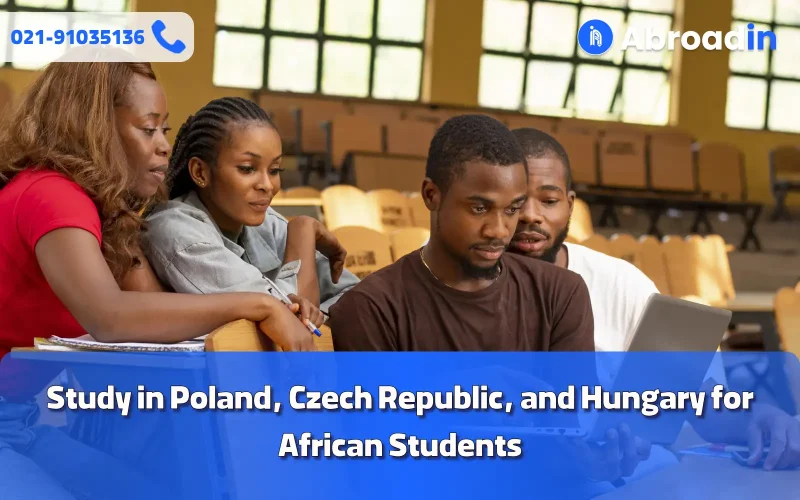

Why Choose Poland, the Czech Republic, and Hungary?
These Central European countries are compelling options for African students seeking affordable, high-quality education abroad.
Poland, the Czech Republic, and Hungary provide globally recognized university degrees, low tuition fees, and reasonable living costs. These features make them better destinations than pricy Western destinations.
Their central European location facilitates easy travel to neighboring countries, enriching students’ cultural experiences. Additionally, scholarships for international students enhance accessibility, particularly for those from African nations.
From an educational perspective, all three countries boast strong academic reputations, for instance:
- Many of Poland’s universities, like Jagiellonian University, excel in medicine and engineering.
- The Czech Republic, home to Charles University, is renowned for its contributions to science and technology.
- With institutions like Eötvös Loránd University, Hungary offers robust mathematics and natural sciences programs.
Tuition fees typically range from $2,000 to $5,000 annually, significantly lower than in Western Europe or North America. Living costs are manageable, too, averaging $500–$800 per month.
Beyond academics, the Czech Republic’s diverse landscapes—rolling hills and lush forests—may appeal to students seeking natural beauty, contrasting with the flatter terrains of Poland and Hungary.
Poland’s dynamic urban centers, like Warsaw and Kraków, blend history and modernity, while Hungary’s Budapest combines stunning architecture with a lively cultural scene.
Each country provides a safe, welcoming environment, though English-taught programs are more prevalent in the Czech Republic and Hungary, easing integration for international students.
Choosing the best among Poland, Hungary, and the Czech Republic depends on specific criteria—education quality, affordability, cultural richness, or personal preferences like lifestyle and environment. Let’s explore them:
Poland: Affordable Education with High Standards
Poland is a cultural hub in Europe, and its richness of culture, from Krakow’s historic charm to Warsaw’s modern energy, enriches student life. International students have access to affordable travel to other European countries.
Top universities, such as the University of Warsaw and Jagiellonian University in Krakow, offer English-taught business, engineering, and medicine programs.
If you want to know more about the costs of studying in Poland, consider these examples, and generalize them to your conditions:
- Tuition for non-EU students, including Africans, ranges from €1,500 to €6,000 yearly.
- Specialized programs like dentistry or MBAs at private institutions may cost up to €15,000 annually.
Living expenses are budget-friendly, averaging €350–€850 monthly. Take a closer look at the details:
- Living in bigger cities, like Warsaw and Krakow cost €500–€850, while
- Smaller cities like Lublin are cheaper at €350–€550.
- Student dormitories cost €60–€150 per month across the country.
- Private rentals range from €250–€750 for a one-bedroom apartment.
- Food expenses are €100–€150 for each person monthly, and
- Public transport semester passes cost around €50.
Scholars like the Polish Government Scholarship cover tuition and stipends for African students. The Visegrad Scholarship Program also supports non-EU students.
If you seek free colleges and universities in Poland for higher education, check out this Abroadin guide.
Non-EU students, including those from African nations, can work 20 hours/week part-time in some certain positions.
There is also a nine-month post-graduation residence permit, which helps international students find related jobs and boosts their career prospects.
Czech Republic: Quality Education at Low Cost
Public universities in the Czech Republic offer free education with B2-level proficiency, achievable through preparatory courses.
Like Prague’s historic architecture, the Czech Republic’s safe environment and cultural richness enhance the student experience. Its central location makes European travel affordable.
English-taught programs cost €2,000–€4,500 annually, far less than most Western European countries. Look at these examples:
- Charles University in Prague, a historic institution, charges €2,000–€3,500 for programs in humanities and medicine.
- The Czech Technical University in Prague, known for engineering, has fees of €3,000–€4,500.
- Masaryk University in Brno, welcoming to internationals, offers programs from €2,500–€4,000.
Living costs in this country are comparably low, averaging €350–€750 monthly. Prague is pricier; Brno and Ostrava are cheaper. For instance:
- Student dormitories cost €120–€200, while
- Private apartments range from €320–€800.
- Food expenses are €100–€150 every month.
- Public transport offers student discounts, keeping costs low.
Scholarships, including government and university grants, ease financial burdens for African students.
Part-time work has no strict hour limits, allowing income from jobs like tutoring. This Abroadin article is about the working limits for international students in Europe.
📚 If you want to know about Top Free Universities in Europe for International Students (2025 Guide) read this article:

Hungary: Budget-Friendly Academic Opportunity
In Hungary, African students find English-taught programs, affordable travel, and a supportive international community.
These are some useful information about education with strong academic credentials in Hungary:
- Tuition fees range from €1,000 to €8,000 annually,
- Most programs charge € 2,000 to €5,000 for international students.
- Eötvös Loránd University (ELTE) in Budapest offers law, psychology, and informatics programs. Tuition starts at €2,200 per semester.
- The University of Debrecen charges €6,000 yearly for bachelor’s degrees, excelling in medicine.
- Budapest Business School provides business programs for €3,000 annually.
- Obuda University offers engineering and computer science at €2,000 per year.
Living costs in Hungary for international students are €500–€800 monthly, including:
- Staying at dormitories costs €200–€300.
- Private apartments cost €350–€500.
- Food expenses are €100–€150 monthly, and
- Public transport is affordable with student discounts.
The Stipendium Hungaricum scholarship, available to students from over 90 countries, including many in Africa, covers tuition, accommodation, and a stipend.
The Central European University, though pricier, provides scholarships for interdisciplinary studies. Read this guide for more sources on finding scholarships in Europe.
Non-EU students can work part-time (20 hours/week) and earn €430–€560 daily for unskilled or skilled jobs.
Comparing the Three Countries: Which Fits You?
Poland, the Czech Republic, and Hungary share affordability and quality but differ in strengths, for instance:
- Poland offers low living costs and diverse English-taught programs, ideal for urban vibrancy.
- The Czech Republic excels with free Czech-taught programs and low English program fees, perfect for language learners or those seeking prestigious universities.
- Hungary stands out with comprehensive scholarships like Stipendium Hungaricum and affordable programs in medicine and business.
When choosing, consider academic goals, budget, and cultural preferences. Poland’s Warsaw suits those seeking bustling cities, while Brno or Debrecen offer quieter, cheaper settings.
Language also matters. Czech free education requires language skills, while Poland and Hungary offer more English options. Scholarships are available in all countries, but Hungary’s are particularly generous.
Take a Look at Comparing Table
The table below compares three countries, highlighting their affordable tuition, living costs, scholarships, and cultural benefits to help African students choose a better destination:
| Criteria | Poland | Czech Republic | Hungary |
| Top Universities | University of Warsaw, Jagiellonian University (Krakow) | Charles University (Prague), Czech Technical University, Masaryk University (Brno) | Eötvös Loránd University (ELTE), University of Debrecen, Budapest Business School |
| Tuition Fees (Annual) | €1,500–€6,000 (up to €15,000 for specialized programs like dentistry/MBAs) | €2,000–€4,500 (free in Czech with B2 proficiency) | €1,000–€8,000 (most programs €2,000–€5,000) |
| Living Costs (Monthly) | €350–€850 (Warsaw/Krakow: €500–€850; smaller cities: €350–€550) | €350–€750 (Prague pricier; Brno/Ostrava cheaper) | €500–€800 |
| Accommodation | Dormitories: €60–€150; Private rentals: €250–€750 | Dormitories: €120–€200; Private apartments: €320–€800 | Dormitories: €200–€300; Private apartments: €350–€500 |
| Food Costs (Monthly) | €100–€150 | €100–€150 | €100–€150 |
| Transport Costs | Semester pass ~€50 | Affordable with student discounts | Affordable with student discounts |
| Scholarships | Polish Government Scholarship, Visegrad Scholarship Program | Government and university grants | Stipendium Hungaricum (covers tuition, accommodation, stipend) |
| Part-Time Work | 20 hours/week; offsets living costs | There are no strict hour limits; jobs like tutoring | 20 hours/week; €430–€560/day for unskilled/skilled jobs |
| Post-Graduation Opportunities | 9-month residence permit for job search | ||
| Cultural & Travel Benefits | Vibrant culture (Krakow, Warsaw); affordable European travel | Safe, historic (Prague), affordable European travel | Rich heritage (Budapest, Debrecen); affordable European travel |
Practical Tips for African Students
Beyond academics, these countries offer unique living experiences for international students. Poland’s multicultural cities host festivals and student events.
The Czech Republic’s safe, picturesque cities like Brno provide a calm study environment.
Each country has growing African student communities, easing cultural transitions. Universities offer support services, from visa guidance to career counseling, ensuring success.
Financial planning is key. Scholarships reduce costs significantly, but students should budget for initial expenses like visa fees and travel.
Part-time work opportunities are plentiful, especially in urban areas. Students can earn enough to cover living costs while gaining work experience alongside their studies.
Cultural immersion is a bonus. From Poland’s historic castles to Hungary’s thermal baths, students can explore Europe affordably, creating lifelong memories.
- Research Thoroughly: Explore universities like Poland’s University of Warsaw, Czech Republic’s Masaryk University, or Hungary’s ELTE. Ensure programs align with career goals. Check scholarship eligibility.
- Budget Smartly: Tuition plan (€1,000–€8,000/year) and living costs (€350–€850/month). Choose dormitories to save on housing. Use student discounts for transport and dining.
- Apply for Scholarships: Seek Poland’s Government Scholarship, Czech university grants, or Hungary’s Stipendium Hungaricum. Apply early to raise your chances.
- Learn Basic Language: English programs are standard, but learning Polish, Czech, or Hungarian aids integration. Czech’s free education requires B2 proficiency.
- Understand Visa Needs: Non-EU students must provide funds (e.g., €12,000/year in Poland) for visas. Consult embassies and university international offices.
- Explore Part-Time Work: All three countries allow 20 hours/week. Jobs in hospitality or tutoring help cover costs.
📚 If you want to know about Scholarships for African Students Available for 2025 read this article:
Conclusion
Poland, the Czech Republic, and Hungary offer African students a rare opportunity: world-class education at a fraction of the cost. These countries offer tuition as low as €1,000–€6,000 annually and living expenses from €350–€850 monthly.
Scholarships like Hungary’s Stipendium Hungaricum and Poland’s Government Scholarship make dreams achievable. Consult with Abroadin experts to seize this chance to study, grow, and explore Europe. Your academic journey starts here.
FAQ
Here are the most frequently asked questions about the top study abroad consultants for Indian students:
Tuition fees in Poland for African students range from €1,500 to €6,000 annually at universities like the University of Warsaw and Jagiellonian University. Specialized programs, such as dentistry or MBAs, may cost up to €15,000 yearly.
Hungary offers the Stipendium Hungaricum scholarship to students from over 90 countries, including many in Africa. The scholarship covers tuition, accommodation, and a stipend.
Living costs in the Czech Republic average €350–€750 monthly. In Prague, expenses are higher, while Brno and Ostrava are cheaper.
African students in Poland can work up to 20 hours per week part-time, earning enough to offset living costs. A nine-month post-graduation residence permit allows job searches, enhancing career prospects.
English-taught programs are standard in the Czech Republic at universities like Charles University and Masaryk University, costing €2,000–€4,500 annually. African students don’t need Czech proficiency for these programs, though learning basic Czech enhances integration.
For downloading PDF of the article fill the form


How useful was this post?
Click on a star to rate it!
Average rating 0 / 5. Vote count: 0
No votes so far! Be the first to rate this post.








No comment yet, add your voice below!